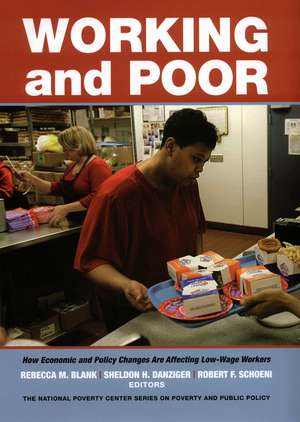Working and Poor: How Economic and Policy Changes Are Affecting Low-Wage Workers: National Poverty Center Series on Poverty and Public Policy
Editat de Rebecca M. Blank, Sheldon Danziger, Robert F. Schoenien Limba Engleză Paperback – 15 oct 2008
Over the last three decades, large-scale economic developments, such as technological change, the decline in unionization, and changing skill requirements, have exacted their biggest toll on low-wage workers. These workers often possess few marketable skills and few resources with which to support themselves during periods of economic transition. In Working and Poor, a distinguished group of economists and policy experts, headlined by editors Rebecca Blank, Sheldon Danziger, and Robert Schoeni, examine how economic and policy changes over the last twenty-five years have affected the well-being of low-wage workers and their families. Working and Poor examines every facet of the economic well-being of less-skilled workers, from employment and earnings opportunities to consumption behavior and social assistance policies. Rebecca Blank and Heidi Schierholz document the different trends in work and wages among less-skilled women and men. Between 1979 and 2003, labor force participation rose rapidly for these women, along with more modest increases in wages, while among the men both employment and wages fell. David Card and John DiNardo review the evidence on how technological changes have affected less-skilled workers and conclude that the effect has been smaller than many observers claim. Philip Levine examines the effectiveness of the Unemployment Insurance program during recessions. He finds that the program's eligibility rules, which deny benefits to workers who have not met minimum earnings requirements, exclude the very people who require help most and should be adjusted to provide for those with the highest need. On the other hand, Therese J. McGuire and David F. Merriman show that government help remains a valuable source of support during economic downturns. They find that during the most recent recession in 2001, when state budgets were stretched thin, legislatures resisted political pressure to cut spending for the poor. Working and Poor provides a valuable analysis of the role that public policy changes can play in improving the plight of the working poor. A comprehensive analysis of trends over the last twenty-five years, this book provides an invaluable reference for the public discussion of work and poverty in America. A Volume in the National Poverty Center Series on Poverty and Public Policy
Preț: 291.59 lei
Nou
Puncte Express: 437
Preț estimativ în valută:
55.79€ • 58.41$ • 46.17£
55.79€ • 58.41$ • 46.17£
Carte indisponibilă temporar
Doresc să fiu notificat când acest titlu va fi disponibil:
Se trimite...
Preluare comenzi: 021 569.72.76
Specificații
ISBN-13: 9780871540645
ISBN-10: 0871540649
Pagini: 448
Dimensiuni: 168 x 235 x 28 mm
Greutate: 0.79 kg
Editura: Russell Sage Foundation
Colecția Russell Sage Foundation
Seria National Poverty Center Series on Poverty and Public Policy
ISBN-10: 0871540649
Pagini: 448
Dimensiuni: 168 x 235 x 28 mm
Greutate: 0.79 kg
Editura: Russell Sage Foundation
Colecția Russell Sage Foundation
Seria National Poverty Center Series on Poverty and Public Policy
Notă biografică
REBECCA M. BLANK is codirector of the National Poverty Center and dean of the Gerald R. Ford School of Public Policy, Henry Carter Adams Collegiate Professor of Public Policy, and professor of economics at the University of Michigan. SHELDON H. DANZIGER is Henry J. Meyer Distinguished University Professor of Public Policy and codirector of the National Poverty Center at the Gerald R. Ford School of Public Policy at the University of Michigan. ROBERT F. SCHOENI is research associate professor at the Institute for Social Research, associate professor of Economics and Public Policy, at the University of Michigan.
Cuprins
Table of Contents Introduction: Work and Poverty During the Past Quarter Century Rebecca Blank/Sheldon Danziger/Robert Schoeni Part I. What is Changing (and Why) in the Labor Market for Low-Skilled Workers? 1.Exploring Gender Differences in Employment and Wage Trends Among Less- Skilled Workers Rebecca M. Blank/Heidi Shierholz 2.Wage Trends among Disadvantaged Minorities George J. Borjas Part II. How do Economic Trends Affect Less-Skilled Workers? 3.The Macroeconomy and Determinants of the Earnings of Less-Skilled Workers Robert Hall 4.The Impact of Technological Change on Low-Wage Workers: A Review David Card/John DiNardo 5.The Changing Pattern of Wage Growth for Low Skilled Workers Eric French/Bhashkar Mazumder/Christopher Taber Part III. How do Macroeconomic Changes Influence Well-Being Measures Beyond Income? 6.The Level and Composition of Consumption Over the Business Cycle: The Role of "Quasi-fixed" Expenditures Kerwin Kofi Charles/Melvin Stephens Jr. 7.Recent Trends in Resource Sharing among the Poor Steven J. Haider/Kathleen McGarry 8.Economic Conditions and Children's Living Arrangements Rebecca A. London/Robert W. Fairlie Part IV. How do Policy Changes Interact with the Economy and Economic Well-being? 9.How do Tax Policies Affect Low-income Workers? Kevin A. Hassett/Anne Moore 10.State Spending on Social Assistance Programs Over the Business Cycle Therese J. McGuire/David F. Merriman 11.Temporary Agency Employment as a Way out of Poverty? David Autor/Susan Houseman 12.Child Support and the Economy Maria Cancian/Daniel R. Meyer 13.Unemployment Insurance over the Business Cycle: Does it Meet the Needs of Less-Skilled Workers? Phillip B. Levine 14.How is Health Insurance Affected by the Economy? Public and Private Coverage among Low-skilled Adults in the 1990s Helen Levy




